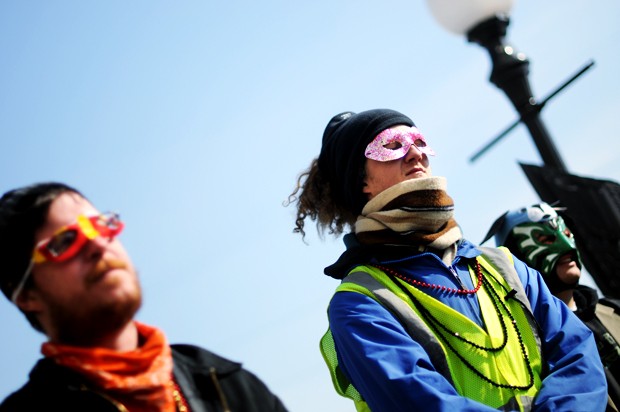Sequin-lined hats, sparkling paper opera masks and other Mardi Gras attire adorned rally-goers who took to the streets of St. Paul on Tuesday to celebrate early steps toward civil action for alleged misconduct during the Republican National Convention. People at the rally blew kazoos to blues music blaring through a portable CD player as marchers went from the Capitol building to St. Paul City Hall, along some of the same streets where police made arrests during the RNC. The prospective plaintiffs celebrated the early step in filing suit against the city of St. Paul, its police department and other governmental entities, formally alleging misconduct during the RNC in September. Notice of Claim forms, which alert a defendant that an incident occurred for which they might be sued, are required for some civil suits. At least 60 Notice of Claim forms have already been filed, rally organizer Rick Kelley said. The documents, which list basic information about the time and place of the incident, notify defendants that they should not destroy evidence they might have that could be related to the case. Notice of Claim forms do not compel a civil suit. Instead, they are a formalized first step toward litigation that can be filed for any violation of any civil right. Robert Kolstad, an attorney whose clientele includes several RNC activists, said police brutality and use of pepper spray, as well as allegedly illegal detainment in addition to stifled rights of expression are grounds for civil suits. The prospective plaintiffs could sue for injunctive relief or monetary damages, depending both on their preference and case facts. âÄúItâÄôs an individual call as to which one of those is worse,âÄù Kolstad said. Injunctive relief would mean an admission of wrongdoing by the defendant and a set guideline for appropriate action in the future. For example, if a plaintiff successfully sues the police department for allegedly improper use of rubber bullets, injunctive relief could come in the form of tightened parameters on when and how such force can be used in the future. The symbolic success of an injunction is significant, even without monetary compensation, Kolstad said. âÄúMoney doesnâÄôt make people whole, necessarily,âÄù he said. âÄúI would consider any finding that there was police misconduct or official misconduct would be a win.âÄù As a condition of hosting the convention, the city of St. Paul stipulated the RNC host committee pay the premium on a $10 million insurance policy for police professional action. That money is available to cover damages and attorneysâÄô fees should any Notices of Claim eventually become successful suits for the plaintiffs. St. Paul City Attorney John Choi referred requests for comment to City Clerk Shari Moore . She was unavailable for comment. The Community RNC Arrestee Support Structure (CRASS) has held multiple civil-litigation workshops to introduce potential plaintiffs to the process. So far, CRASS member Jude Ortiz said several dozen people have participated âÄî and the group isnâÄôt stopping its efforts to get the word out. âÄúItâÄôs been really encouraging to know that even though the RNC is still far in the past for so many people,âÄù he said, âÄúthereâÄôs still a lot of passionate energy toward holding the city accountable for the atrocities we all experienced that week.âÄù Because CRASS is encouraging people adversely affected by all aspects of the RNC âÄî not only protesters who allege police misconduct âÄî to file claims, publicity is a big task. Reaching St. Paul residents disrupted by the police presence and would-be protesters who either left early or didnâÄôt go to the RNC at all because of excessive police presence requires casting a wide reach, Ortiz said. âÄúWeâÄôre trying to reach out as broadly as possible,âÄù Ortiz said. âÄúNot only protesters were brutalized by police that week.âÄù Groups including CRASS have reviewed video surveillance obtained through Data Practices Act requests and other evidence that Ortiz said favors potential plaintiffs. Ortiz said CRASS is helping coordinate communication and facilitate small group and class action suits for those who suffered physical or emotional harm during the RNC. Other factions include those who where pepper-sprayed in the streets or who lost property when they were detained, he said. Along the Mardi Gras march, several protestors pointed to street corners and sidewalks where they said they were tear gassed or arrested. Kolstad, who has begun exploring several RNC-related civil cases, said heâÄôs hopeful for the plaintiffsâÄô success. âÄúThereâÄôs definitely going to be some that are successful,âÄù he said. âÄúItâÄôs just a matter of which ones, and how successful.âÄù Still, Kolstad has serious concerns. Regardless of how this civil action turns out, he said, there is little assurance future events wonâÄôt parallel the controversy-wrought RNC. âÄúItâÄôs almost an evil of money,âÄù Kolstad said. âÄúYou can pay people off, but you really never make them whole, and nothing happens to make sure that, in the future, this doesnâÄôt happen again.âÄù âÄîKarlee Weinmann is a senior staff reporter. Alex Ebert contributed to this report.

Image by Stephen Maturen
Labour dispute
Rally-goers start process of suing St. Paul
A Mardi Gras march celebrated early steps in the civil litigation process.
Published February 24, 2009
0
More to Discover







